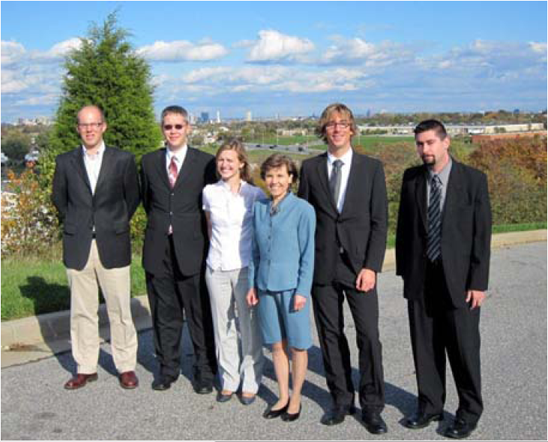![]() Synthesis and Characterization of Novel Energetic Materials
Synthesis and Characterization of Novel Energetic Materials
PI: Prof. Michael Zachariah and Dr. James Short
In 2009, the CECD appointed Professor Thomas Klapötke as Visiting Professor of Mechanical Engineering and Chemistry at the University of Maryland, College Park. He also has an Energetics Technology Center appointment as Visiting Scientist. The appointments will also enable Prof. Klapötke to work with NSWCIH and ARL. In October, two Klapötke research associates, Dr. Joerg Stierstorfer and Mr. Franz Martin did the first CECD synthesis of energetic ingredients in a campus laboratory established by Professor Michael Zachariah. Before returning to Munich in early November, they made as much as two grams of RDX and equal amounts of other experimental energetic compounds.
Aberdeen Enthusiasm for CECD Synthesis
Dr. Betsy Rice, a research chemist in the ARL Weapons and Materials Research Directorate is Klapötke’s closest Army associate. As a consequence of Department of Defense Base Realignment and Closure decisions made in 2005, considerable growth is coming to Aberdeen in 2011. New facilities being constructed create the potential for growth of Dr. Rice’s energetics research program. That growth stimulates the CECD growth into synthesis chemistry. In anticipation of the new Aberdeen chemistry laboratories, Dr. Rice filled two postdoctoral positions with synthesis chemists. Dr. Rice sent two chemists, Dr. Kim Spangler and Dr. Matt Sherrill, not experienced in energetic synthesis, to CECD to learn from Dr. Joerg Stierstorfer and Mr. Franz Martin.
Dr. Rice is enthusiastic about the future of this new collaboration, “my postdocs are very excited about [the time spent] with Klapötke’s associates. Aberdeen needs to start getting University of Maryland students up here. It is a very exciting venture.” Rice continues: “I could not be more pleased with the three-week collaboration between my ARL postdocs and the LMU students at the UMD labs. The interaction turned out better than I thought possible, mainly because it provided my students with extraordinary tutelage in a new research effort.”
Dr. Kim Spangler and Dr. Matt Sherrill, are equally optimistic. From Dr. Spangler: “Joerg and Franz relayed their experiences and taught me techniques that are not typical of a traditional synthetic chemistry curriculum.” Dr. Sherrill spent three months with Prof. Klapötke in Munich, “I hope the Aberdeen collaboration with Maryland and LMU will continue to provide opportunities in the future.” That future will be enabled early in 2010 when an LMU postdoctoral student arrives at College Park to work with Prof. Zachariah and his students. The plan then is to continue the operation of the CECD synthesis laboratory into the future with Prof. Zachariah’s students and LMU research associates.
LMU on CECD Collaboration
Dr. Stierstorfer and Mr. Martin echo Dr. Sherrill‘s remarks. From Dr. Stierstorfer “We … gained experience in many constructive and interesting discussions within the CECD and the ARL. All our endeavors are dedicated to strengthening our very good partnerships within the United States.” Mr. Martin continues on the same theme “Collaboration requires agreement on the goals of the efforts, an understanding of how the goals will be attained, and an awareness of the state of the collaborative effort.”

F. Martin, E. Byrd, K. Spangler, B. Rice, J. Stierstorfer, and M. Sherrill

